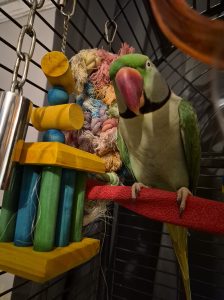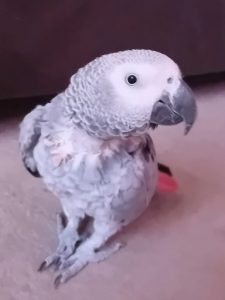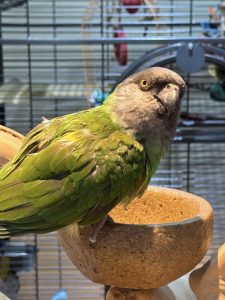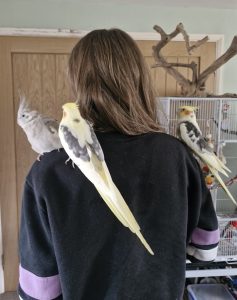
Cockatoo
Cockatoos vary in size the most common cockatoos you will find are The White Cockatoos. The most obvious external feature of any cockatoo is the erectile crest that rises immediately after alighting and when alarmed or excited. The strong, heavy beak of the cockatoo is used to crack large seeds but can also produce a powerful and destructive bite.
With a lifespan of up to 80 years with some cockatoo species, these birds CAN make wonderful lifelong friends. They have lovely personalities and a cuddly nature.
Further information
Cockatoos are very complex birds and are known as Velcro Birds because of their need for attention and affection. These friendly birds should not be taken lightly they can and will be very very noisy and destructive on the other hand they are very friendly birds and often good talkers, cockatoos are very challenging and need an experienced and committed carers who are willing to provide a lot of training, toys and love.
Cockatoos also tend to bond and can over bond with one person this can cause problems in a family environment as these birds need to be out of their cages for very long periods of the day, so someone who works 8 hours a day would not really be suitable unless you have a “birdroom” or an aviary
Cockatoos DO SCREAM do not be fooled by them when they are young below 2 years old they are still babies and don’t find their voice straight away but they are prone to screaming and calling they do this in the wild to call their flock and re group they also do this to warn others of danger so why should they be any different in your home environment.
The biggest lesson us as the carers need to realise this is their natural behaviour BUT it should not be a constant thing is usually happens for 30 to 60 minutes in the morning and again around tea time and then before dusk. But as a rating 1 – 10 we are giving the cockatoos a 9.
The cockatoo breeding season begins in winter through to spring. Maturity age is between three to eight years old. The female cockatoo will lay between 2 to 3 eggs. Be warned cockatoos can and will be very aggressive and vocal during these months.
Some of the common illnesses your cockatoo could contract are parasites, intestinal inflammation, PDD, coccidiosis, respiratory ailments, feather picking, and parrot fever also known as psittacosis which is not common but is contagious to humans and can be dangerous. Psittacine beak and feather disease (Circovirus infection or PBFD) is a problem that is frequently encountered in the white cockatoo species. Due to its highly contagious nature to other parrot species, it is advisable to avoid any bird suspected of having this condition. Cockatoos also are prone to plucking and in a lot of cases mutilation as they are so sensitive and complex this is all to common.
Moluccan Cockatoo
Major Mitchells Cockatoo
Umbrella Cockatoo
Galah Cockatoo
Greater Sulphur Crested / Triton Cockatoo
Medium Sulphur Crested Cockatoo
Lesser Sulphur Crested Cockatoo
Ducorps Cockatoo
Goffins Cockatoo
Bare eyed Cockatoo
Black palm Cockatoo
Cockatoos should be provided a balanced diet of equal shares of pellets, seeds and vegetables with a good quantity of fruits, nuts, proteins, cooked rice, bean mixture and table food like corn, cereal, pasta, meat etc. Your bird should NOT be fed only a seed diet on a daily basis, it will lead to deficiency in vitamins. So, a supplement of vitamins may be necessary in that case. As with all birds a good multivitamin is essential.
More information
Read more about other parrot species
30+
years experience between our members
30+
years experience between our members
30+
years experience between our members
Our feathered friends
Looking for new homes
From loving tickles to lifelong friend












